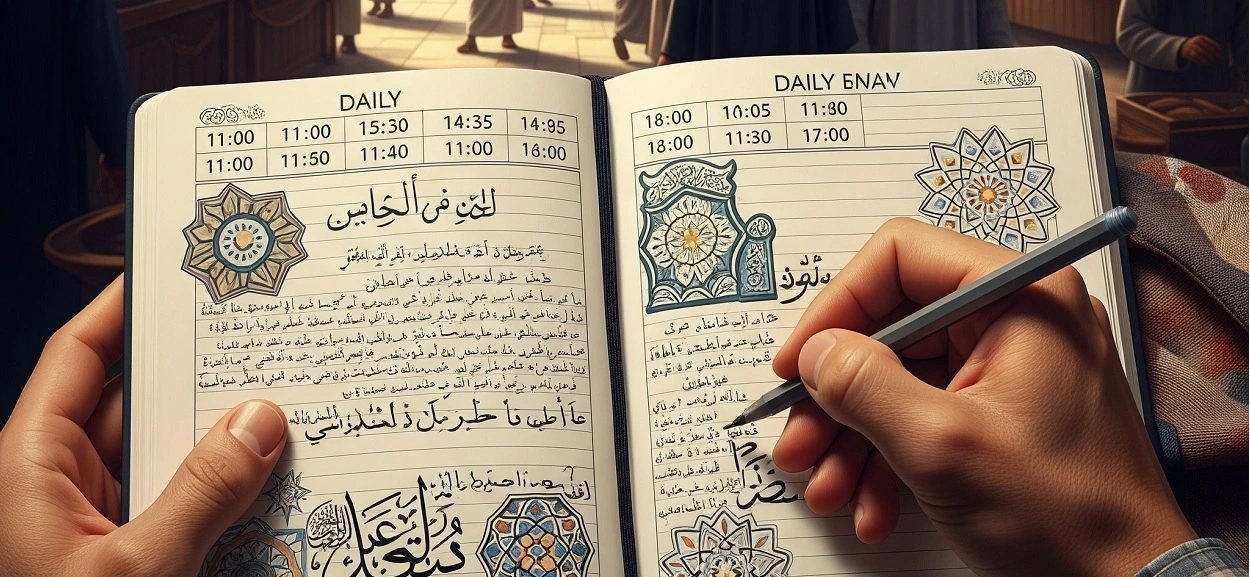Complete Guide: How to Manage Time Like a Productive Muslim for a Blessed Life
Want your time to be more blessed and productive? Follow this step-by-step guide to managing time like a Muslim, from intention, prayer-based schedules, to self-reflection. Achieve a blessed life now!

In the midst of modern life’s hustle and bustle, time seems to fly by, often leaving us feeling exhausted and overwhelmed. We want to be productive Muslims, balancing worship, work, family, and social obligations, but often don’t know where to start. If you feel this way, you’re not alone.
The good news is that Islam has provided us with a timeless “guide” to time management. It’s not just a theory, but a set of principles and practices that, when applied, can transform your life to be more blessed, peaceful, and efficient. This article will be your complete guide on how to manage time like a productive Muslim through concrete, actionable steps you can implement immediately.
Why Is Time Management Important in Islam?
Before we go further, let’s understand why managing time the Islamic way isn’t just about “getting more done,” but about the very foundation of a Muslim’s life:
- Divine Trust: Time is one of the greatest blessings and trusts from Allah SWT. We will be held accountable for every second we’ve used.
- Hereafter Capital: Every good deed requires time. Time is our “currency” to invest in the Hereafter.
- Inner Peace: An organized life brings peace of mind, reduces stress, and allows us to worship with khushu’ (devotion).
Let’s begin this Muslim time management journey!
Step 1: Intention and Islamic Priorities – The Foundation of All Actions
Before creating a schedule or a to-do list, start with intention and Islamic priorities. This is a fundamental step.
- Identify Life Goals According to Sharia:
- Ask yourself: What is my main purpose in life as a Muslim? (Ideal answer: seeking Allah’s pleasure, worshipping Him, being a vicegerent on Earth, preparing for the Hereafter).
- Break down these big goals into smaller ones in various aspects: worship (e.g., completing the Quran this year), personal (e.g., learning Arabic), family (e.g., spending quality time with children daily), professional (e.g., contributing positively at work).
- Prioritize Worship Above All Else:
- The five obligatory prayers (salat fard) are the top, non-negotiable priorities.
- Then come other obligations like reading the Quran, dhikr (remembrance of Allah), and seeking religious knowledge.
- Practice: Dedicate 15-30 minutes at the beginning of the week to reflect and write down your main intentions and goals for that week, referring back to your long-term life purpose. Ensure a clear portion for worship, in addition to worldly tasks.
Step 2: Prayer-Based Daily Schedule – Your Time Framework
The five daily prayers are the best natural “Time Markers” for a Muslim. Use prayer times as the main framework for structuring your schedule.
- Before Fajr (Fajr Power Hour):
- The best time to start the day. Wake up early, perform Fajr prayer.
- After that, use the time for dhikr, reading the Quran, Dhuha prayer, or planning your 3-5 most important tasks for the day. Prophet Muhammad (PBUH) said, “O Allah, bless my Ummah in their early mornings.” (HR. Abu Dawud).
- Between Dhuha and Dhuhr:
- Peak productivity time for tasks requiring high focus.
- Example: completing important reports, studying, or deep work.
- Dhuhr:
- A break for prayer, lunch, and refreshing your mind.
- Quick evaluation: Are you on track? What needs adjustment?
- Between Asr and Maghrib:
- This time is often challenging, but can be filled with lighter tasks, meetings, or social activities.
- For some, this is also a good time to seek knowledge.
- Maghrib & Isha:
- Time for family, dinner, and rest.
- After Isha, focus on light worship, daily evaluation (muhasabah), or preparing for sleep. Avoid unnecessary late nights.
- Practice: Create a visual schedule in your notebook or digital calendar app, with prayer slots as fixed points. Then, fill the gaps with your tasks. This is the most effective Muslim time management guide.
Step 3: Managing Tasks with Islamic Principles – Avoid Israf of Time
How do we choose and complete tasks? Apply Islamic principles:
- Prioritize What’s Most Beneficial (This World & Hereafter):
- Choose tasks that have a long-term positive impact, whether for your career, family, or provisions for the afterlife (e.g., seeking knowledge, helping others).
- The concept of amal jariyah (ongoing charity/good deed) can be applied to your work: can this work become a continuous source of reward?
- Avoid Israf (Wastefulness of Time):
- Israf applies not only to wealth but also to time. Avoid activities that waste time without clear benefit (e.g., aimless social media scrolling, excessive binge-watching).
- Every task should have a clear purpose.
- Practice:
- Use the ‘Two-Minute Rule’: If a task can be done in 2 minutes or less, do it immediately.
- Create a “Don’t Do List” of things that frequently waste your time and commit to avoiding them.
Step 4: Overcoming Procrastination (Taswif) the Islamic Way – Rely on Allah and Act
Procrastination is the main enemy of Islamic productivity tips. How to overcome it?
- Strong Intention and Istighfar (Seeking Forgiveness):
- Renew your intention that you are doing this for the sake of Allah.
- If you feel overwhelmed, say istighfar and ask Allah for strength.
- Start Small:
- If a task feels big, break it into smaller parts. Just start with the first step.
- Prophet Muhammad (PBUH) said, “The most beloved deeds to Allah are those that are done consistently, even if they are few.” (HR. Bukhari & Muslim). Consistency is more important than perfection at the start.
- Tawakkal (Trust in Allah) After Effort:
- Exert your best effort, then surrender the results to Allah. This removes the burden of anxiety about outcomes and makes it easier for you to act.
- Practice: Implement the Pomodoro Technique: 25 minutes of focused work, 5 minutes break (can be used for dhikr). Then, repeat.
Step 5: Blessed Free Time – Recharging Your Faith Battery
Free time is not to be wasted but to be filled with beneficial activities, both worldly and for the Hereafter.
- Increase Religious Knowledge:
- Listen to lectures, read religious books, or attend online/offline study circles.
- ”…No people gather in one of the houses of Allah (mosques) to recite the Book of Allah and study it among themselves, but tranquility descends upon them, mercy envelops them, angels surround them, and Allah mentions them among those with Him.” (HR. Muslim).
- Strengthen Kinship Ties (Silaturahim):
- Visit family, friends, or neighbors. This extends life and increases sustenance.
- Exercise and Health:
- Take care of your body. A healthy body supports worship and productivity.
- Positive Hobbies:
- Engage in calming and beneficial hobbies, such as gardening, painting, or writing.
- Practice: Create a “Blessed Free Time Ideas List” that you can refer to when you have free time. Examples: 1) Read Surah Al-Kahf, 2) Listen to a lecture by [Ustadh’s Name], 3) Call parents, 4) Go for a walk in the park.
Step 6: Muhasabah (Self-Reflection) and Self-Evaluation – Reflection for Improvement
Regular evaluation is key to continuously improving your Muslim time management guide.
- Muhasabah Daily/Weekly:
- At the end of the day or week, spend 10-15 minutes reflecting on:
- Were my prayer times observed?
- What important tasks were completed?
- What time was wasted?
- What can I improve tomorrow/next week?
- Caliph Umar ibn al-Khattab (RA) said, “Hold yourselves accountable before you are held accountable.”
- Practice: Use a journal or a simple mood tracker app to note how you felt at the end of the day and how effective your time usage was. Don’t judge yourself too harshly; focus on improvement.
Conclusion: Blessings Lie in Obedience and Discipline
Managing time like a productive Muslim isn’t about becoming a perfect robot, but about building habits that align with Islamic values. It’s a continuous journey towards a better, calmer, and closer version of yourself to Allah SWT. With a sincere intention, a prayer-based schedule, efficient task management, overcoming procrastination, filling free time with blessings, and self-reflection, you will experience immense blessings in life.
Ready for your life transformation? Start by implementing one or two steps from this guide today. Feel how every second can become an act of worship and an investment in goodness.
[Download Your Short Islamic Time Management Checklist Here!] (Link to Freebie/Opt-in)
Want more Islamic tips and guides for a more productive and blessed life? [Subscribe to Our Newsletter Now!] (Link to Newsletter Sign-up)





Comments